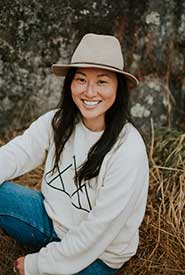Style meets sustainability: Circular fashion comes to Vancouver
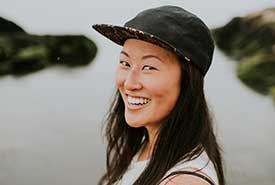
To Kaya, sustainability means doing the absolute best she can in every aspect of the business. (Photo by Kaya Dorey)
What does sustainable even mean?
The word “sustainability” is overused and misused over and over again. It also has a tendency to turn people off in a conversation because as soon as you say it, their guard goes up and they stop listening. My assumption for this is that when you say the word sustainability, people often think about all of the things they have to give up to be a more sustainably minded person. They think about the food they won’t be able to eat, the cars they won’t be able to drive, the clothing they won’t be able to wear. But, I think there is another way. In order to sell sustainability, it has to be cool, and it has to be the best choice regardless of how “eco-friendly” it is. This is my mission ― make sustainability cool.
After doing a project on textiles waste at the British Columbia Institute of Technology, I learned all about synthetic fabrics and how, when you blend them with either natural or other synthetics, you can’t recycle them and they don’t biodegrade. I also learned about all the textiles that are ending up in landfills and how linear fast fashion is perpetuating the problem at an ever-accelerating rate.
A recent report by the Ellen MacArthur Foundation found that more than half of fast fashion apparel is disposed of in less than a year, and one garbage truck of textiles is thrown into landfill or incinerated every second. I learned even more about the micro plastics that shed off our polyester clothing in the wash and eventually end up in our food chain and drinking water. All of this led me to want to work for a brand that cared about protecting people and the planet but also made cool clothing. I couldn’t find any brands that suited both my style and values, so I decided to start my own company and went on a mission to create a circular model that took responsibility for the products I was making. It was time for a solution that wasn’t the landfill.
Sustainability to me means doing the absolute best I can in every aspect of the business. It means using the most sustainable fabrics, natural thread (not polyester, plastic thread) and no toxic dyes. For shipping, I use biodegradable and recycled envelopes, biodegradable labels and biodegradable tape (yes, it exists). All of my marketing materials, including 12X12 graphic prints, business cards and postcards, are printed on recycled paper with veggie-based inks. You might think its overkill, but for me, there’s no other way. It would be backwards to have a sustainable clothing brand and then ship orders in single-use plastic bags and dye my product with toxic dyes.
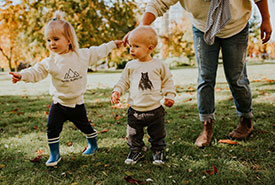
Fabric scraps are made into apparel for kids. (Photo by Cassandra Casley, Twist & Shutter)
As for fabric waste, I have created a few ways to eliminate it from my production. I have partnered with Abel Wear, a non-profit that is offering training in sewing to women with barriers to employment. I deliver my fabric scraps to them and they sew them into baby apparel. I get very limited runs of the kids’ apparel, so I sell directly through Instagram when I have it.
The rest of the scraps go to an organization called Fabcycle, which uses fabric waste for community projects.
How can we make sustainability work?
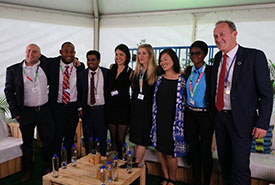
Kaya Dorey (third from right) with five other Young Champions and members of the UN Environment Assembly. (Photo by Niko Palosuo, Covestro)
When I was in Nairobi for the UN Environment Assembly in December 2017, someone asked me, “How can you make sustainability appealing to the next generation?” I responded that, “You have to make sustainability cool. Most people aren’t willing to sacrifice their style or lifestyles to be more sustainable so you have to make it undeniably the best choice, sustainability aside.”
Keepin’ it ethical
Apparel manufacturing is one of the dirtiest industries. Not only are employees often underage and underpaid, but the factories they work in are generally not safe. Also, the countries where we make clothing generally have way less environmental regulations in place, and dumping toxins down a river is the norm. The impacts go well beyond the factory and mill workers and are passed on to many of the people in surrounding villages through water contamination.
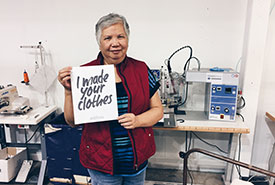
Ida, one of the very talented women who sews apparel for my company, at Syte Industries (Photo by Kaya Dorey)
All of my apparel is made in Vancouver, BC. Although the industry here in Vancouver is still not perfect, all of the people sewing my apparel are operating in safe working conditions and are being paid fair wages. I also love being able to go to my manufacturers and talk to them in person.
What does the future look like?
Winning the UN’s Young Champions of the Earth prize is one of the biggest accomplishments of my life. With the $15,000 U.S. seed money I won, I plan to take the next steps in my business to make it fully closed-loop, which essentially means none of my products or by-products will end up in the landfill. I will do this by developing a take-back program that takes apparel back at the end of its life and repurposes, recycles or composts it. This will accomplish at least three things:
- Take responsibility for the products I make
- Divert textiles from the landfill
- Create a closed-loop model that can be implemented globally
I’ll also look into automated manufacturing as a solution to the challenges faced in the local manufacturing industry. All of the sewers making our clothing in Vancouver are either close to or in their 50s, with very few new, younger people being trained in the field. With the increasing demand for local production and the retiring wave on the horizon, we have to innovate and think about alternatives. I think that automated manufacturing is the way to solve this problem. Although it is in its early days, there are machines out there that can already sew simple garments. They are generally limited to one garment per workline, but with technological advances happening quickly, I believe it won’t be very long until they can do multiple garments on the same workline. Over the next year, it will be my mission to see if it’s feasible to bring this to Vancouver. Here I go.

